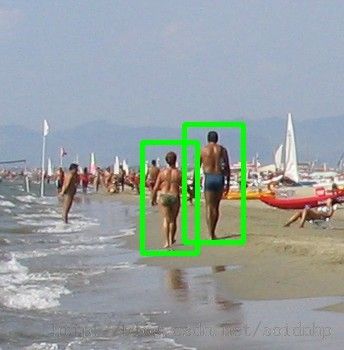OpenCV Demo :行人检测(HOG+SVM)
HOG算法的基本思想是统计梯度方向,形成梯度方向直方图,然后让SVM训练,分类。是一种针对静态图片的行人检测经典方法
首先看下效果
HOG算法对于直立的行人有很好的检测效果,但是要是来个弯腰驼背那就难说了。
一、数据库下载
本文选择有挑战性的INRIA数据库,下载链接http://pascal.inrialpes.fr/data/human/,也可选择比较理想的MIT数据库。
其余数据库参见我转载的一篇博客:行人检测资源汇总 http://blog.csdn.net/soidnhp/article/details/11540327
二、创建图像列表
因为我想运行一次程序能测试多张图片,因为没运行一次只测试一张实在不是人干的活……这样的话就得把一堆图像的路径保存到一个List文件中。如果像我这样懒得选图片的可以直接从INRIA数据库中目录\Test的pos.lst中选取一部分,然后保存成一个.txt文件。
比如我这里新建一个posListINRIA.txt文件,文件内容如下:
E:\MachineVision\Reference\ObjectDtetect\数据库\INRIAPerson\Train/pos/crop001815.png
E:\MachineVision\Reference\ObjectDtetect\数据库\INRIAPerson\Test/pos/crop_000001.png
E:\MachineVision\Reference\ObjectDtetect\数据库\INRIAPerson\Test/pos/crop_000002.png
E:\MachineVision\Reference\ObjectDtetect\数据库\INRIAPerson\Test/pos/crop_000003.png
E:\MachineVision\Reference\ObjectDtetect\数据库\INRIAPerson\Test/pos/crop_000004.png
E:\MachineVision\Reference\ObjectDtetect\数据库\INRIAPerson\Test/pos/crop_000005.png
E:\MachineVision\Reference\ObjectDtetect\数据库\INRIAPerson\Test/pos/crop_000006.png
E:\MachineVision\Reference\ObjectDtetect\数据库\INRIAPerson\Test/pos/crop_000007.png
E:\MachineVision\Reference\ObjectDtetect\数据库\INRIAPerson\Test/pos/crop_000008.png
E:\MachineVision\Reference\ObjectDtetect\数据库\INRIAPerson\Test/pos/crop_000009.png
三、创建工程
源码如下:
#include "opencv2/imgproc/imgproc.hpp"
#include "opencv2/objdetect/objdetect.hpp"
#include "opencv2/highgui/highgui.hpp"
#include <stdio.h>
#include <string.h>
#include <ctype.h>
using namespace cv;
using namespace std;
// static void help()
// {
// printf(
// "\nDemonstrate the use of the HoG descriptor using\n"
// " HOGDescriptor::hog.setSVMDetector(HOGDescriptor::getDefaultPeopleDetector());\n"
// "Usage:\n"
// "./peopledetect (<image_filename> | <image_list>.txt)\n\n");
// }
int main(int argc, char** argv)
{
Mat img;
FILE* f = 0;
char _filename[1024];
//char *_filename="posListINRIA.txt";
//if( argc == 1 )
//{
// printf("Usage: peopledetect (<image_filename> | <image_list>.txt)\n");
// return 0;
//}
//img = imread(argv[1]);
//img = imread("negListINRIA.txt");
//if( img.data )
//{
// strcpy(_filename, argv[1]);
//}
//else
//{
// f = fopen(argv[1], "rt");
// if(!f)
// {
// fprintf( stderr, "ERROR: the specified file could not be loaded\n");
// return -1;
// }
//}
f = fopen("posListINRIA.txt", "rt");
HOGDescriptor hog;
hog.setSVMDetector(HOGDescriptor::getDefaultPeopleDetector());
namedWindow("people detector", 1);
for(;;)
{
char* filename = _filename;
if(f)
{
if(!fgets(filename, (int)sizeof(_filename)-2, f)) //每次读取一行,即一张图片的路径
//destination,maxnumber,souce,返回读取的字符串,遇到换行或EOF结束
//最多能读取maxnumber-1个字符,因为默认会加上‘\0’,要给它预留位置
break;
//while(*filename && isspace(*filename))
// ++filename;
if(filename[0] == '#')
continue;
int l = (int)strlen(filename);
while(l > 0 && isspace(filename[l-1]))
--l;
filename[l] = '\0';
img = imread(filename); //每次循环都会读取一张图片
}
printf("%s:\n", filename);
if(!img.data)
continue;
fflush(stdout);//清除文件缓冲区。以写方式打开文件时,将缓冲区内容写入文件
vector<Rect> found, found_filtered;
double t = (double)getTickCount();
// run the detector with default parameters. to get a higher hit-rate
// (and more false alarms, respectively), decrease the hitThreshold and
// groupThreshold (set groupThreshold to 0 to turn off the grouping completely).
hog.detectMultiScale(img, found, 0, Size(8,8), Size(32,32), 1.05, 2);
/*
img – Source image.
found_locations – objects boundaries(x,y,width,height).
hit_threshold – Threshold for the distance between features and SVM classifying plane.
win_stride – Window stride. It must be a multiple of block stride.
padding – Mock parameter to keep the CPU interface compatibility. It must be (0,0). ????
scale0 – Coefficient of the detection window increase.
group_threshold – Coefficient to regulate the similarity threshold. When detected, some
objects can be covered by many rectangles. 0 means not to perform grouping. 原本能检测一个人,当设为4的时候居然没了
*/
t = (double)getTickCount() - t;
printf("tdetection time = %gms\n", t*1000./cv::getTickFrequency());
size_t i, j;
for( i = 0; i < found.size(); i++ )//去掉空间中具有内外包含关系的区域,保留大的
{
Rect r = found[i];
for( j = 0; j < found.size(); j++ )
if( j != i && (r & found[j]) == r)
break;
if( j == found.size() )
found_filtered.push_back(r);
}
for( i = 0; i < found_filtered.size(); i++ )
{
Rect r = found_filtered[i];
// the HOG detector returns slightly larger rectangles than the real objects.
// so we slightly shrink the rectangles to get a nicer output.
r.x += cvRound(r.width*0.1);
r.width = cvRound(r.width*0.8);
r.y += cvRound(r.height*0.07);
r.height = cvRound(r.height*0.8);
rectangle(img, r.tl(), r.br(), cv::Scalar(0,255,0), 3);// tl:the top-left corner,br: the bottom-right corner
}
imshow("people detector", img);
int c = waitKey(5000) & 255;
if( c == 'q' || c == 'Q' || !f)
break;
}
if(f)
fclose(f);
return 0;
}
记得运行的时候,要把图像列表文件放在工程文件下。
我这里改成5秒钟之后自动处理下一张图片,你也可以将鼠标停留在图像窗口,按下任意键手动激活处理下一张图片
enjoy it!
